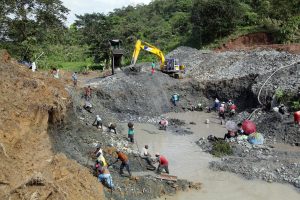 A new study by the African Center for Economic Transformation (ACET) indicated that Ghana could raise the standard of living of rural farmers, meet the nation’s food needs, and transform the economy if new approaches to farming, processing, and marketing cassava, cocoa, poultry, and rice are applied.
A new study by the African Center for Economic Transformation (ACET) indicated that Ghana could raise the standard of living of rural farmers, meet the nation’s food needs, and transform the economy if new approaches to farming, processing, and marketing cassava, cocoa, poultry, and rice are applied.
The Deputy Minister of Food and Agriculture, Dr. Yakubu Alhassan, who launched the report entitled-‘ ‘Promoting Sustainable Rural Transformation’ in Accra, noted that in 2000, 80 percent of the chicken consumed in Ghana was produced in Ghana and only 10 percent by 2010.
“A dollar spent on imported food is a lost opportunity for jobs at home,” he emphasized in his opening remarks.
As the country pushes for consumption of made-in-Ghana products, this report showed the constraints to production and how to overcome them. To boost poultry production, for instance, the report highlights that used fridges can be modified to hatch eggs. The study brings insights into how to make that happen, especially through agroprocessing.
Presenting the report to stakeholders, Dr. Julius Gatune, a senior Policy Advisor at ACET and the principal author of the report said –“Most of the local production of cassava is geared towards varieties that make good fufu. As a Kenyan expatriate, I have come to appreciate the value of fufu, but local industries are in desperate need of varieties that make good beer and starch too. That’s an opportunity for expansion of production.”
On the surface, labour is cheap and abundant in Ghana, but the farmers surveyed reported skilled labour as one their biggest constraints. To overcome the labour constraints and to boost yield, the report calls for a mega shift towards mechanization.
While the value of Ghana’s cocoa exports have been increasing steadily, the country’s productivity is only one-third that of benchmark countries. Production is dominated by ageing, illiterate farmers who do not have the resources to rehabilitate farms and cannot take up new technologies.
In this constraint Dr. Gatune sees an opportunity for a new trend: “It’s an opportunity for a middle class sharecropper, one who brings capital and technology in return for a share of profits.”
The Ghana study is part of a larger study of five countries (Ghana, Burkina Faso, Kenya, Tanzania, and Uganda) sponsored by the Bill and Melinda Gates Foundation to promote sustainable rural transformation.
African Eye News.com




